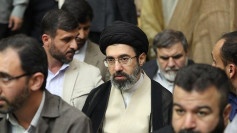North Korea appeared to test Sunday the most powerful missile it has launched since United States President Joe Biden took office.
The launch comes as North Korea resurrects its old brinkmanship playbook in order to wrest concessions from the United States and its neighbors in the face of a protracted diplomatic stalemate.
The Joint Chiefs of Staff of South Korea reported that a projectile believed to be a single ballistic missile was launched towards the sea from North Korea's Jagang Province at around 7:52 a.m.
The launch of the intermediate-range ballistic missile (IRBM) was first reported on Sunday by South Korean and Japanese officials. It was North Korea's seventh test this month, and the first time a nuclear-capable missile of that size had been launched since 2017.
According to the South Korean and Japanese militaries, the missile was launched on a high trajectory, apparently to avoid neighboring territorial spaces, and reached a maximum altitude of 2,000 kilometers before landing in the sea.
The South Korean president's office, led by Moon Jae-in, described the projectile as an intermediate-range ballistic missile and condemned the test as a violation of the United Nations Security Council resolutions.
North Korea confirmed the projectile was the Hwasong-12 intermediate-range ballistic missile on Monday. According to flight data, it was the North's most powerful launch since November 2017, when it tested a much higher-flying intercontinental ballistic missile.
"That's a bigger [longer-range] missile than anything since November 2017," tweeted Ankit Panda of the Carnegie Endowment for International Peace. "It's most likely an IRBM."
Leader Kim Jong Un has stated his desire to strengthen the country's military and modernize its weaponry, with a hypersonic missile among seven launches since the beginning of the year in a flurry of testing unseen since 2017.
The U.S. is concerned that North Korea's escalating missile tests will pave the way for the resumption of nuclear weapons and intercontinental ballistic missile (ICBM) tests, and has promised an unspecified response "designed to demonstrate our commitment to our allies," a senior U.S. official told reporters in Washington.
Despite his desperate need for outside help, Kim has shown no willingness to give up the nuclear weapons and missiles he sees as his best chance of survival.
Analysts believe Kim's pressure campaign is intended to persuade Washington to recognize the North as a nuclear power and to convert their nuclear disarmament-for-aid diplomacy into negotiations for mutual arms reduction.






